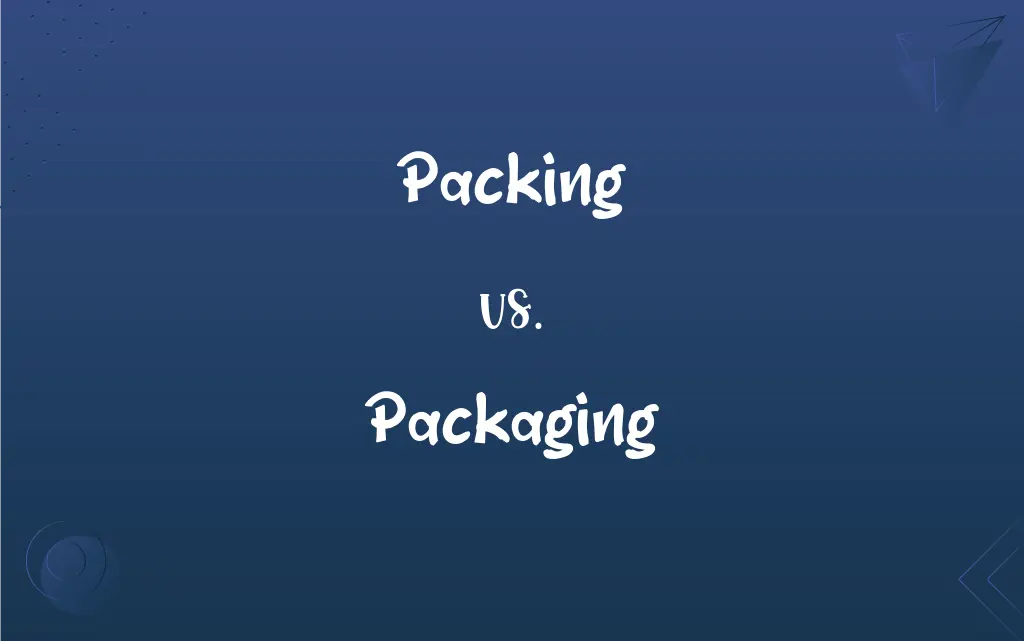Packing vs. Packaging: What's the Difference?
Edited by Harlon Moss || By Janet White || Updated on October 22, 2023
Packing is the process of arranging items for storage or transport; Packaging refers to materials used to protect and present products.

Key Differences
Packing is essentially the method of preparing and arranging goods or items securely for transport, storage, or sale, whereas Packaging is the material used to protect, contain, and present products, often with a focus on aesthetics and information conveyance.
Packing can involve placing items in boxes, crates, or containers, and it often involves the use of protective materials to prevent damage. Packaging, on the other hand, generally pertains to the design and production of the containers or wrapping for products.
Packing is a crucial step in moving or shipping, ensuring the safe arrival of goods. Conversely, Packaging is crucial in marketing, as it is often the first impression a consumer has of a product and can influence purchasing decisions.
Packing does not necessarily involve presenting information about the contents, it is mostly concerned with protection and organization. Packaging, in contrast, often features labels, instructions, and branding, providing essential information to the consumer.
The intention behind Packing is often practical, focused on protection and convenience during transit. Packaging aims to appeal to consumers, protect the product, and convey information, serving both practical and promotional purposes.
ADVERTISEMENT
Comparison Chart
Definition
Process of arranging items for transport or storage.
Material used to protect, contain, and present products.
Focus
Protection and organization during transit.
Aesthetics, information conveyance, and protection.
Involvement
Placing items in containers with protective materials.
Designing and producing containers or wrapping.
Role in Marketing
Minimal influence on consumer decisions.
Crucial for brand perception and consumer decisions.
Information Presentation
Not primarily concerned with presenting information.
Often features labels, instructions, and branding.
ADVERTISEMENT
Packing and Packaging Definitions
Packing
Arranging items securely for transport or storage.
They spent the entire day packing their belongings for the move.
Packaging
Materials used to protect, contain, and present products.
The product’s packaging was so attractive; it drew many consumers.
Packing
The act of filling or stuffing materials to protect items.
The packing of peanuts ensured the fragile glassware was secure.
Packaging
Presentation and protection of products for distribution.
The cereal is in a plastic packaging to maintain freshness.
Packing
The act or process of one that packs.
Packaging
The design and production of the container or wrapping of a product.
The new packaging design significantly boosted the product's market presence.
Packing
The processing and packaging of manufactured products, especially food products.
Packaging
The act, process, industry, art, or style of packing.
Packing
A material used to prevent leakage or seepage, as around a pipe joint.
Packaging
Material used for making packages.
Packing
The insertion of gauze or other material into a body cavity or wound for therapeutic purposes.
Packaging
The manner in which something, such as a proposal or product, or someone, such as a candidate or author, is presented to the public.
Packing
The material so used; a pack.
Packaging
Present participle of package
Packing
Present participle of pack
Packaging
The act of packing something.
Packing
The action of the verb.
Packaging
The materials used to pack something.
Packing
The action of putting things together, especially of putting clothes into a suitcase for a journey.
Packaging
The industry that produces such material.
Packing
The spatial arrangement of objects, items or constituent parts.
Packaging
(by extension) The manner in which a person or product is promoted.
Packing
The gathering of birds, animals etc. into a pack.
Packaging
The business of packaging;
The packaging of new ideas
Packaging for transport
Packing
(rugby) The forming of players into a scrum.
Packaging
A message issued in behalf of some product or cause or idea or person or institution
Packing
As a concrete noun.
Packaging
Material used to make packages
Packing
Material used to fill in the space around something, especially to make a piston etc. watertight or airtight.
Packaging
The act or process of presenting a product in a container or wrapper.
The company invested a lot in innovative packaging to appeal to young consumers.
Packing
Material used to wrap a product for sale etc.; packaging.
Packaging
A container or wrapper in which a product is enclosed.
Many companies are opting for eco-friendly packaging to reduce environmental impact.
Packing
A fee charged to cover the costs of packaging.
Packing
Special material used to fill containers or vessels for certain chemically related applications.
Packing in a packed bed, or a column such as a distillation column or a chromatography column
Packing
Clipping of meatpacking
Packing
The act or process of one who packs.
Packing
Any material used to pack, fill up, or make close.
Packing
Same as Filling.
Packing
A trick; collusion.
Packing
Any material used especially to protect something
Packing
The enclosure of something in a package or box
Packing
Carrying something in a pack on the back;
The backpacking of oxygen is essential for astronauts
Packing
Filling a space tightly with material.
The box was tight after packing it with clothes.
Packing
The action or process of preparing goods for shipment.
Proper packing is crucial to avoid damage during transit.
Packing
Preparing and placing products in containers for distribution.
The company is very diligent about the packing of its products.
FAQs
What is the primary purpose of Packaging?
Packaging primarily serves to protect, contain, and present products, often focusing on aesthetics and information conveyance.
What does Packing involve?
Packing involves arranging and securing items for transport or storage.
Can Packing include using protective materials?
Yes, packing often involves using protective materials like bubble wrap to prevent damage during transit.
Is Packing concerned with product presentation?
No, packing is mostly focused on protection and organization, not product presentation.
Is information conveyance a role of Packaging?
Yes, packaging often conveys essential information like instructions, labels, and branding to the consumer.
Can Packaging be eco-friendly?
Yes, many companies are adopting eco-friendly packaging options to reduce environmental impact.
Does Packaging play a role in marketing?
Yes, packaging is crucial in marketing, influencing consumer perception and purchasing decisions.
Can Packaging influence consumer behavior?
Absolutely, effective packaging can attract consumers and influence their purchasing decisions.
Does Packing involve labeling and branding?
Not necessarily, packing is mostly focused on protection and organization of items.
What is the role of Packing in shipment?
In shipment, packing ensures the safe transit of goods by preventing damage.
Is Packing only relevant during moving?
No, packing is also relevant in shipping, storing, and organizing items.
Does Packaging include designing?
Yes, packaging involves the design and production of containers or wrapping for products.
Is the material used in Packing considered Packaging?
No, while packing uses materials to protect items, it does not encompass the design and presentation aspect of packaging.
Is the aesthetic appeal a concern in Packaging?
Yes, aesthetic appeal is a significant concern in packaging as it can affect consumer perceptions and brand image.
Do Packing and Packaging work together in product distribution?
Yes, packing and packaging work together to protect and present products effectively during distribution.
About Author
Written by
Janet WhiteJanet White has been an esteemed writer and blogger for Difference Wiki. Holding a Master's degree in Science and Medical Journalism from the prestigious Boston University, she has consistently demonstrated her expertise and passion for her field. When she's not immersed in her work, Janet relishes her time exercising, delving into a good book, and cherishing moments with friends and family.
Edited by
Harlon MossHarlon is a seasoned quality moderator and accomplished content writer for Difference Wiki. An alumnus of the prestigious University of California, he earned his degree in Computer Science. Leveraging his academic background, Harlon brings a meticulous and informed perspective to his work, ensuring content accuracy and excellence.






































































